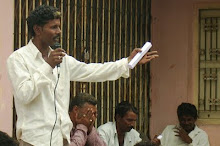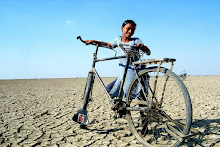Pratibha Misra; Ahmedabad, October 18: The Indian Express
State Govt, NGO initiative to focus on providing basic education and vocational training
When salt workers of Kharaghoda in the Little Rann of Kutch wanted to apply for government identity cards, it was their children who read out the registration while they simply gave thumb imprints.
Mahesh Singhal, son of a salt-pan worker, trained as a health worker at the Karamsad Medical college and now works at Adesan village in the Little Rann of Kutch. Singhal has taken steps against malaria and other diseases, the bane of salt-pan workers.
It’s perhaps a sign that times may be changing for children of salt-pan workers in the State. Saddled with a hazardous life, these children faced a bleak future. But now the State Government has taken the initiative of providing these children basic education along with NGOs working for the workers.
In a State which produces 70 per cent of the country’s salt, the salt-pan workers weren’t given their due share. With a lack of basic education and an alternative livelihood scheme, children of these salt-pan workers most often follow the salt-laden path of their parents.
But efforts by NGOs like Ganatar, a core member of Agariya Heet Rakshak Manch (AHRM) working for the upliftment of salt-pan workers, may bring a whiff of change with State Government planning to adopt the education model provided by Ganatar as a supplementary model for salt-pan workers’ children.
The State Government has also allocated Rs 4.7 crore from the central educational budget for providing better educational facilities like schools and hostels for children of salt workers.
Ganatar, working at providing basic primary education to the children of salt-pan workers for a decade now, has sucessfully come up with two models of basic education. The two models — schools at workplace for children studing till Std IV and seasonal hostels for children studying in Std V-VII — help check the rising illiteracy rate among salt-pan workers.
The children of the workers, who migrate to the salt pans across the State every year around October, leave school midway to accompany their parents. This leads to them dropping out of school and having to enroll in the same class once they return home after the salt pans close for the season.
Says Sukhdev Patel of Ganatar, “Over time, this leads to the children losing interest in studies and giving it up altogether. With no other source of earning, they also turn to the one livelihood source they are aware of — the salt-pans.”
He futhers adds, “We have come up with two models of providing these children with basic education upto Std VII. The State Government’s budget of of Rs 4.7 crore is for this scheme.”
“It has been decided that 50 seasonal hostels for children who should stay at their native villages even when their parents migrate will be made and 50 schools at workplaces for children who migrate to the salt-pans will be constructed out of the grant,” he adds.
In another effort to provide definite skills and vocational training to these kids, Ganatar has come up with a programme under which children who have completed their Std VII are put up at the Gijubhai Bal Academy till they complete SSC free of cost. At present around 80 students are undergoing the programme in which for the first two years, the children are taught vocational skills like carpentary, weaving, automobile repairing, fabrication, making baked food items.
Says Ghanshyam Jhula, a member of AHRM, “Schooling and education help bring about a change in the attitude of these children. They become more aware of various facilities available for them.”
The efforts by the various organisations and Government have borne fruit with Keshubhai Surani, a disabled salt-pan worker, getting admission into the U N Mehta College of Morbi, with help from the industries department. Keshubhai, whose parents work at a salt-pan in the Little Rann of Kutch, wants to study further.
Mahesh Singhal, son of a salt-pan worker, trained as a health worker at the Karamsad Medical college and now works at Adesan village in the Little Rann of Kutch. Singhal has taken steps against malaria and other diseases, the bane of salt-pan workers.
It’s perhaps a sign that times may be changing for children of salt-pan workers in the State. Saddled with a hazardous life, these children faced a bleak future. But now the State Government has taken the initiative of providing these children basic education along with NGOs working for the workers.
In a State which produces 70 per cent of the country’s salt, the salt-pan workers weren’t given their due share. With a lack of basic education and an alternative livelihood scheme, children of these salt-pan workers most often follow the salt-laden path of their parents.
But efforts by NGOs like Ganatar, a core member of Agariya Heet Rakshak Manch (AHRM) working for the upliftment of salt-pan workers, may bring a whiff of change with State Government planning to adopt the education model provided by Ganatar as a supplementary model for salt-pan workers’ children.
The State Government has also allocated Rs 4.7 crore from the central educational budget for providing better educational facilities like schools and hostels for children of salt workers.
Ganatar, working at providing basic primary education to the children of salt-pan workers for a decade now, has sucessfully come up with two models of basic education. The two models — schools at workplace for children studing till Std IV and seasonal hostels for children studying in Std V-VII — help check the rising illiteracy rate among salt-pan workers.
The children of the workers, who migrate to the salt pans across the State every year around October, leave school midway to accompany their parents. This leads to them dropping out of school and having to enroll in the same class once they return home after the salt pans close for the season.
Says Sukhdev Patel of Ganatar, “Over time, this leads to the children losing interest in studies and giving it up altogether. With no other source of earning, they also turn to the one livelihood source they are aware of — the salt-pans.”
He futhers adds, “We have come up with two models of providing these children with basic education upto Std VII. The State Government’s budget of of Rs 4.7 crore is for this scheme.”
“It has been decided that 50 seasonal hostels for children who should stay at their native villages even when their parents migrate will be made and 50 schools at workplaces for children who migrate to the salt-pans will be constructed out of the grant,” he adds.
In another effort to provide definite skills and vocational training to these kids, Ganatar has come up with a programme under which children who have completed their Std VII are put up at the Gijubhai Bal Academy till they complete SSC free of cost. At present around 80 students are undergoing the programme in which for the first two years, the children are taught vocational skills like carpentary, weaving, automobile repairing, fabrication, making baked food items.
Says Ghanshyam Jhula, a member of AHRM, “Schooling and education help bring about a change in the attitude of these children. They become more aware of various facilities available for them.”
The efforts by the various organisations and Government have borne fruit with Keshubhai Surani, a disabled salt-pan worker, getting admission into the U N Mehta College of Morbi, with help from the industries department. Keshubhai, whose parents work at a salt-pan in the Little Rann of Kutch, wants to study further.
















.jpg)
.jpg)
.jpg)
.jpg)













No comments:
Post a Comment